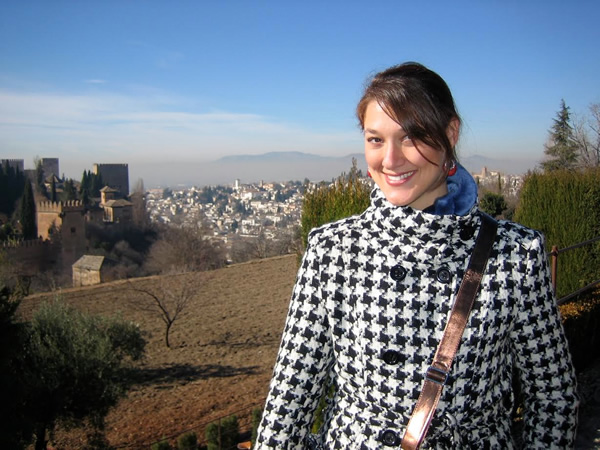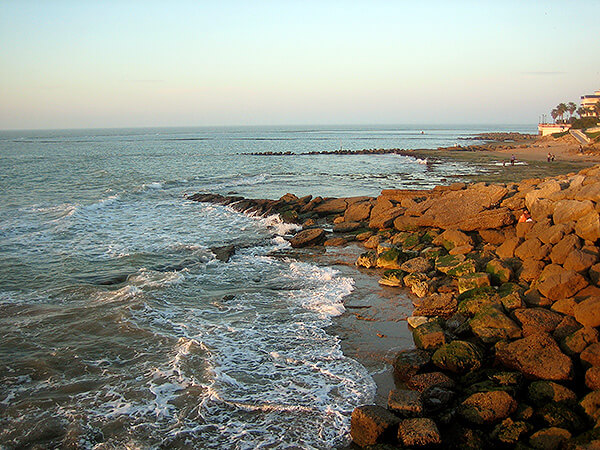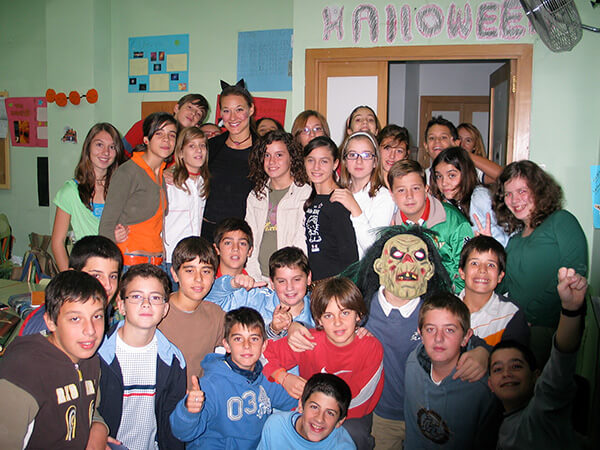|
Learning The Second Time Around
An Student Odyssey Studying, Working and Living Abroad
Article and Photos by Nicole Tobin

|
|
Author at the Al Hambra in Granada, Spain.
|
The semester in France spent traveling using a Eurail pass and mastering the subjunctive, or the summer in Mexico staring at ceilings to analyze murals or chatting at taco stands in the middle of the night are often considered to be “the time of one’s life.” Study abroad is the opportunity to see a new world, to expand horizons and to investigate oneself in relation to one’s own country and the world. But often this amazing linguistic, cultural, and personal experience is considered a one-semester or one-academic-year adventure, to be appreciated but not repeated. It doesn’t have to be this way! I’m living proof, having studied and worked abroad with various programs throughout my undergraduate and graduate years and beyond. Each of my experiences has become progressively more focused on my interests and goals, and each adventure has supplemented my education and has created new avenues to consider. Wanderlust, if followed carefully and with purpose, can bring exciting and useful experiences to your life, studies and resume.
Often the first study abroad experience centers on expanding one’s borders; it consists in learning that there is more to the world than what you previously knew and were comfortable with. You will probably experience some culture shock — you will get sick of walking 45 minutes to school among stares or catcalls, you will go broke buying calling cards that need cryptic codes and have operators who speak only foreign languages rapidly...but you will overcome it. Soon you will travel independently and grow more confident as an adult traveler. You may learn about South American politics, Mexican art, and Muslim influence in Spain, or master the pronunciation of nasals in French. You will grow a lot, but the goals for your first experience abroad will likely be somewhat undefined. But that's ok. With so much to gain from the experience you can focus on its entirety; you can learn to look at the bigger picture.
Study or Work Abroad the Second Time Around
The second (or third or fourth, etc.) time around, you will have been enlightened by your first experience and realizations regarding the things you think you could have done better. In turn, this will allow you to refine your goals and create objectives that are clear and achievable. You may also have more options for program choices if you have studied a language or subject in greater depth than you had the first time around. Try to transform your thought process from simply “study abroad” to “using international studies to complement educational or career goals.” You can accomplish this by finding a program that focuses on your specific major, or choosing to study a language that is important in your field, or even going to a university that has a specific professor with whom you are interested in working. Try to tailor your program/country choice to future goals and needs.
The second time around you will also have the opportunity to improve upon the things that you wish you had done the first time around. For language learning you will set your browser homepage to a native-language newspaper, perhaps, or listen to the native-language radio instead of the usual U.S. online station. You will try to go out with “the natives” sometimes, even if it is more of a struggle to communicate, and will learn to have fun even when there are mistranslations or miscommunications. You will get a language exchange partner and actually work hard to keep the relationship ongoing during your entire stay in the country. Perhaps you will even choose to do an internship or job abroad to further immerse yourself in that culture. As for travel, perhaps you may want to forego the major sites that you’ve already seen and focus on seeing the local sites; explore the hidden gems that tourists can’t easily find. The “big sites” will always be there, and will be easy for a future-jetsetter like you to get to in later travels, but your time as a resident in your temporary home offers you a different and often more personal experience. You may choose to go to a small fishing village off-the-beaten-track where your friend’s grandma lives, or you may visit a wine distributor’s cork farm one rainy Sunday. You will grow to realize that these are intimate views into a culture that few people get to see. And now you will grow to realize how important it is to make and take the time to look.

|
|
Beach at Chipiona, where the author's friend's grandma lives and where the author spent a long weekend playing parcheesi and barbequeing.
|
A Student's Odyssey
So, how do you get yourself to cork farms on rainy days? Well, it does take planning and flexibility and gumption to go abroad even once, let alone multiple times, but it can be done. Allow me tell you my story as one of many possibilities. Take what you like from it for yourself, or use it to dream about an experience you may create in your future.
It’s been a wild ride, which began on a whim and continues with ever-greater drive as each new experience leads me to hone in on my goals. As a sophomore, I decided that I wanted to study abroad but didn’t want to commit to a year and decided that studying in a foreign language would be too scary. So, I signed up for a program called Semester at Sea, which is a program that takes you around the world, studying and traveling in a variety of countries along the way. The courses are all in English and much of the travel is organized, so it was a comfortable introduction to the world of international study. I was exposed to parts of the world that I had never dreamed of seeing, and this opportunity gave me an in-depth view into a world that had never crossed my mind before. I absorbed many experiences from the trip. Perhaps the most important moment was during our last stop, in Morocco, where I found myself chatting in very basic French (which I had studied for four years) with a taxi driver, thrilled by the idea that perhaps the study of languages was actually useful and would help me seek out future adventures. Such a simple exchange changed my life. I left SAS motivated to study languages and to go abroad again.
The experience in Morocco renewed my interest in studying French, and a year later, after cramming my schedule with French classes to prepare me (and convince my parents I was serious), I participated in the CIEE study abroad program in Rennes, France. The goal was to “be fluent,” (which I now know takes more than one academic year), and my focus was completely on language learning. I took a full load of French classes and became quite fluent, met some amazing people (with some of whom I am still in contact), played on the university basketball team, and traveled all over Europe during the weekends. I would have to say that I had a very typical European study abroad experience and thoroughly enjoyed it. Yet, I did leave the program feeling that I could have learned more about the local culture and language. I had socialized almost entirely with large groups of Americans, which made meeting French and learning the non-academic, vernacular aspect of the language difficult. Also, by traveling all over Europe every weekend, I felt that I missed out on really learning about the local French culture surrounding me.
And so I once again left my study abroad experience with a fantastic sense of accomplishment and enthusiasm, but also with the goal to do it again, and to fine tune the experience. However, graduation from college complicated things. I no longer was qualified to participate in organized study abroad through my university. My new goal became to find a job abroad. I went at it with enthusiasm, but met with only difficulties. I found that getting a work visa — especially in Europe — was complicated, and working without one was illegal and risky. I applied for many jobs in Europe, but was told again and again that I needed a visa in order to work. Of course the catch-22 is that I needed a job to get a visa. There are many options for work and internships (see the links at end of this article), but after reviewing the positions available and my career goals, I decided to enter graduate school in the U.S. instead of going abroad immediately.
Beginning graduate school opened doors to organized programs once again, and as I honed in on a future career in study abroad or bilingual education. I decided that although I had significant experience in French, it would be advantageous to study an additional language. I made a calculated move and chose to study Spanish to make myself more marketable in the U.S. ESL market or the international study abroad market, where knowledge of the language is greatly valued. I was a large-loan-bearing graduate student, and thus knew I needed to find a scholarship in order to afford to go. So, I researched programs which offered courses in both Spanish language and Mexican culture and arts. Such programs would provide a good fit with my education in linguistics and art/culture. I also chose a program that I thought would value my desire to help others in language and cultural learning. I hoped that in so doing I would be offered a scholarship. This required me to write a strong essay stating how the program fit with my educational and career goals. By doing so, I was able to secure a scholarship for the CIEE summer program in Mexico, where I began an affair with the Spanish language. My advice for finding study abroad funding is to look for a program that truly fits your particular interests. Explain in your essay why you are a unique applicant and why you are motivated to participate in that specific program. Don’t be shy — you must explain why you deserve and/or need the scholarship.
Finding Work Abroad
So, was I done after studying abroad the third time? Of course not. As my M.A. studies neared their end, I began looking for work abroad. With graduate studies under my belt, the search was quite a bit easier than before. I did a lot of research, both with Graduate Exchange Programs through my university and private work abroad with American companies or schools. I applied to three jobs — it was an exhaustive process searching and finding jobs for which I was qualified and then an equally difficult process to actually apply. Letters of reference, photos, official documents, language certifications, and interviews in foreign languages were required. If you do plan to work abroad as an American citizen, expect to apply several months before the job begins and expect to put in a great deal of time getting the paperwork together. I felt proud that I was following my dream even if it wasn’t the usual or the easy route. You need to plan ahead, though, to make this dream a reality. You must be organized and deliberate about fulfilling each and every step while filling out all the paperwork in the application process.
In the end I was offered two of the three positions I applied for. I accepted the Graduate Exchange position to teach English at the University of Seville, Spain for the year. My university offered many opportunities to do a teaching or research exchange for either a semester or a year. The opportunities are generally interesting, decently paid, and allow you to integrate yourself more fully into the academic culture of a new country. Additionally, for a graduate student, an exchange is even more interesting since many of the study abroad programs run by private companies are geared towards undergraduates. Most of these study abroad programs do not offer graduate level courses or attract older students.
The year teaching EFL as the graduate exchange lecturer was eye-opening. Since I didn’t come with an educational program which offered social activities, I had no choice but to jump right into the work culture and fend for myself. I was teaching classes of 50 and 100 students, trying to improve my Spanish and working to integrate myself into the foreign culture as best I could with my still-minimal Spanish. The experience was a bit overwhelming to take on during my first full-time teaching job. However, I learned to teach large classes, organize, prioritize, and ask for help when needed. Above all, I began to fully realize how difficult it is to truly immerse yourself into a host culture and a new language. I thrived on the challenge and joy of living abroad: There were no major problems in my classes (although I would not say that large classes are ideal for language learning). I continued to learn Spanish thanks to the classes and a few patient Spaniards (and above all sheer necessity). I walked by the third largest cathedral in the world each day, and I became very accustomed to a little siesta in the afternoon, especially if there had been tapas involved the night before. I finished my year as the Graduate Exchange Teacher in Seville and felt that my experience in Spain had not yet come to an end — there was still room for improvement in terms of my knowledge of Spanish. Thus, since the position involved a one-year appointment, I looked once again for new options to stay abroad.

|
|
Some of the bilingual students with the author on Halloween at the public high school where she works.
|
I faced the same problem as before — that it is difficult to get a work visa in Europe. After some investigation, however, I found a government program that allows North Americans to teach English in Spain, offering a small salary, health insurance and a visa. Once again, the application process was less than fun, easy, or cheap, but it was worth it in the end. The program places 1,000 Americans and Canadians in Spain each year, and I was lucky enough to secure a position in a bilingual high school only 45 minutes from Seville. This is my current position, and I couldn’t be happier. I am learning about the Spanish school system, seeing how a bilingual program works, overseeing language learning daily, and helping students learn and have fun in English. Anyone who has earned a college degree within the last seven years (B.A. or M.A.) can participate in this program, and I think it is especially useful for anyone interested in education. France also has a similar program, and with some investigation you should be able to find similar offerings in other countries.
What next? I doubt that the story will end here. I’ve been researching for the future. There is always the Fulbright for young scholars, or additional work abroad as an EFL teacher, as well as some interesting government scholarships for recent graduates. The aim is to have each new opportunity fulfill a new goal while helping to inspire new goals for the future. So, as a seasoned study-abroader, what’s my advice? Follow your heart. If you want to go abroad once or even ten times, with some work, some planning, and some flexibility in terms of when and where you go, you should succeed. You only have one wild and precious life, so make it yours, develop it, and guide it where you would like it to go. You won’t probably end up where you thought, but you will end up happy!
Nicole Tobin will be officially graduating from Indiana University in the summer of 2008 with a dual-M.A. in Comparative Literature and Arts and TESOL/Applied Linguistics. She is currently enrolled as a doctoral student at the University of Seville (Spain) in the program for Second Language Acquisition. She has turned her wanderlust into a lifestyle and career — studying and/or working abroad for several years around the world. She hopes to work in the field of study abroad or bilingual education in a leadership role in the future. This summer she hopes to participate in the Camino de Santiago — a pilgrimage from the Eastern side of Spain all the way to the Western side — and will continue her experience working in a bilingual public school in Spain for the upcoming year.
Nicole Tobin has studied/worked abroad several times:
1996, Semester at Sea;
1998-1999, CIEE year in Rennes, France;
2003, CIEE summer program in Guanajuato, Mexico;
2006-2007, Graduate Student Exchange through Indiana University/University of Seville;
2007/2008, Worked for Language and Culture Assistant Program in Andalucia, Spain.
|
